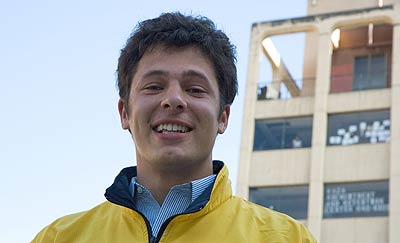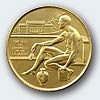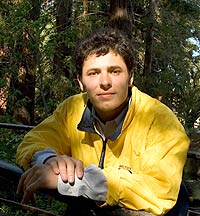UC Berkeley Web Feature
 |
Nate Singer in front of Eshleman Hall, where he spent almost as much time in the DeCal office as he did in class during 2003-2004. (BAP photos) |
Math major and former DeCal director Nate Singer leaves Berkeley a richer place
BERKELEY – Nathaniel Singer was a big chess player as a kid, which isn't that surprising for a math major. "I've always looked several moves ahead," he says with a smile. Even in high school, Singer knew where he wanted to go to college and exactly what he wanted from it, which was "to immerse myself and learn how to think more critically. I knew Berkeley was the best place to develop ideas, because more than most universities, it allows dissent."
 The University Medal The University MedalEstablished in 1871 by California Governor Henry Huntly Haight, the University Medal honors UC Berkeley's most distinguished graduating senior. Three to five students are also named as finalists. Three previous winners have returned their medallions, then made of 14-karat gold, to Berkeley as gifts. The last to do so was Clothilde Grunksy Taylor '14, as a 90th birthday present to herself in 1981: "I received so much from the university — I had a wonderful time there — and I wanted to give a little of it back," said Taylor. Having appreciated in value 100 times, the medal was worth $4,000.  The 2005 Medalist: Alejandra
Dubcovsky, scholar
of slave letters, wins University Medal The 2005 Medalist: Alejandra
Dubcovsky, scholar
of slave letters, wins University Medal
The Finalists
|
His persistence paid off: after leaving his hometown of Rochester, N.Y., to spend the fall of 2000 as a photographer's assistant in New York City, he was admitted to Berkeley for spring 2001. In December 2004, Singer graduated Phi Beta Kappa with a GPA of 4.0 (including six A-pluses), having won several prestigious scholarships, including the Robert Gordon and Ida W. Sproul Scholarship (awarded to Berkeley's top junior male and female students), and having been named a finalist for the Rhodes Scholarship and the campus's top prize, the University Medal.
But more remarkable than what Singer takes away with him is what he leaves behind. "Few, if any, students over the years have made more important contributions to education at Berkeley," writes education professor John Hurst in a letter recommending Singer for the medal. During Singer's two years as director of Democratic Education at Cal (DeCal), he transformed the student-run educational program from "the bane of the University administration, to an exemplary program.[cited] as an example of the incredible creativity and contribution of Berkeley students to education at Berkeley," continues Hurst, DeCal's informal adviser since its formation in 1980. (For more about DeCal, read "DeCal helps students teach one another" in the Berkeleyan archives.)
Mind the beautiful
Interviewed at the Bear's Lair on a visit back to Berkeley from Belgium, where he was working, Singer is outgoing and intense, equally playful and passionate about his interest in math and education. He cheerfully claims to have slept nine hours a night the majority of his time at Berkeley, and to have always made time to do things he enjoyed, whether hiking in the Berkeley hills, reading for his own edification, or building things with his hands, such as a 25-foot window box and rooftop organic garden for the Rochsdale co-op house where he lived.
Singer comes from a long line of artists, not mathematicians: his father is a painter who teaches at a university, while his mother is a pianist who works at a nonprofit. But their sensibility has rubbed off on his approach to math: "I'm attracted to things I find beautiful. Math is challenging, hard as hell, but I think it's beautiful, because it's this language that can describe incredibly well what's going on in the real world," he explains.
For Singer, theoretical concepts are interesting, but their real-world application is even more fascinating. Theodore Slaman, chair of the math department at Berkeley, writes that Singer is "far from the usual mathematics major. He is a terrific mathematician, deeply and intimately involved with the subject, but he spends all of his free time thinking of ways to similarly enliven his peers."
 'Education done wrong creates apathy and selfishness, deteriorates community, and creates a society in which citizens are unable to influence the directions of their lives.' -from Nathaniel Singer's University Medal essay |
Democracy in action
Singer got involved with DeCal in Spring 2003, after he came back from a chilly semester at the Independent University of Moscow, Russia's top math university. That's when he signed up to facilitate a class called "BeeTV," short for Berkeley Educational Television project, to explore why there is little or no educational television aimed at middle school students.
The DeCal class was a major turning point for Singer's outlook, and his Cal career. It's not that he fell in love with teaching - he emphasizes that DeCal facilitators don't teach, they learn along with the students in the class - he fell in love with a new paradigm for pedagogy.
"Every professor should have to teach a class under the conditions of DeCal, where they have to motivate the students to learn the subject without the threat of grades," he says. Singer learned as much from his fellow students in the class as they did from him, and realized the value of the intellectual community created by DeCal, which connects students with other students interested in the same topic.
But in 2003, DeCal's survival was being threatened by a chaotic infrastructure and some rough public scrutiny. When Singer won a $10,000 Donald A. Strauss public-service scholarship for the BeeTV project, he got permission instead to plow the money into revitalizing DeCal. "If DeCal didn't exist, my class couldn't exist, and neither would all the other classes," he explains.
He recruited other passionate DeCal students (his co-director and friend Holly Wagenet is now DeCal's director); bought new computers; designed a new Web page and publicity materials; and most importantly, began studying how organizations are run and how to redefine DeCal's educational philosophy. In a matter of months under Singer's leadership, the number of DeCal courses increased by 50 percent, to around 150, while program staffing went from 2 to 14.
"Nathaniel deserves credit not simply for saving an important campus institution (although he has certainly done that)," writes Christina Maslach, vice provost for undergraduate education, "but, more importantly, for increasing its value as a learning opportunity for the hundreds of students who lead and the thousands of students who take these courses each year."
The experience of turning around DeCal awakened an interest in organizational structure for Singer. In June, he will start work at the San Francisco office of Bain & Company, a consulting firm, to discover how real-world organizations work — part of his two-pronged mouthful of a goal for the future: "To understand leadership and entrepreneurialism in organizations, and in information access, organization, and retrieval for strategic formation and scenario planning."
Eventually, he may end up back in education: "Academia is an amazing place to develop ideas," he says. "You get to meet other interested and motivated people, and they don't have dollar signs in their eyes. There are few other places that celebrate learning for its own sake."


 Getting to Berkeley wasn't smooth sailing for polyglot chemistry whiz Tanguy Chau
Getting to Berkeley wasn't smooth sailing for polyglot chemistry whiz Tanguy Chau Math major and former DeCal director Nate Singer leaves Berkeley a richer place
Math major and former DeCal director Nate Singer leaves Berkeley a richer place Computer science major David Sontag juggles both artificial and human intelligence
Computer science major David Sontag juggles both artificial and human intelligence In defending the Earth, Denise Grab
finds a way to combine her lifelong passions
In defending the Earth, Denise Grab
finds a way to combine her lifelong passions Anthropology major Kelly Fong reconstructs the Asian immigrant experience
Anthropology major Kelly Fong reconstructs the Asian immigrant experience